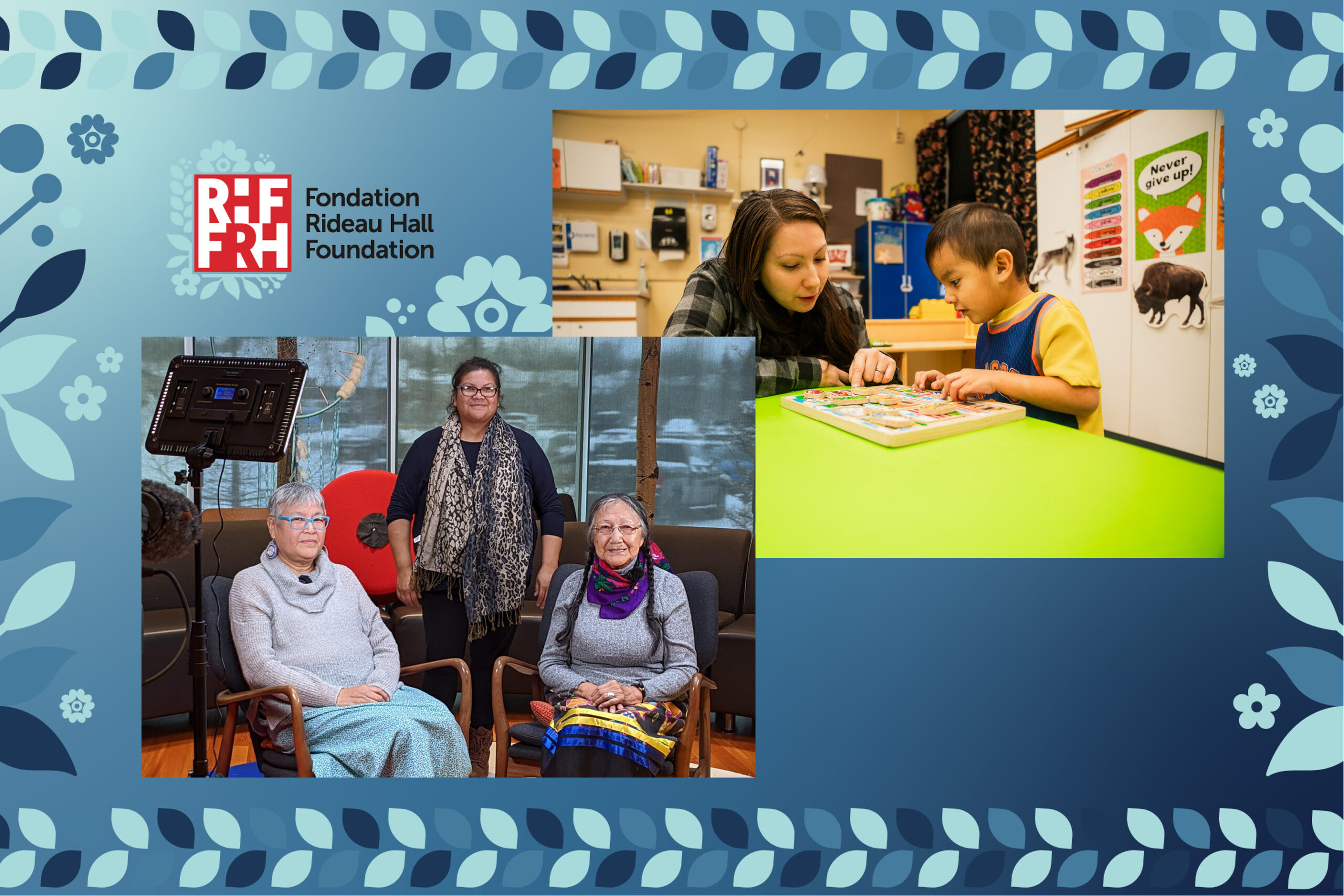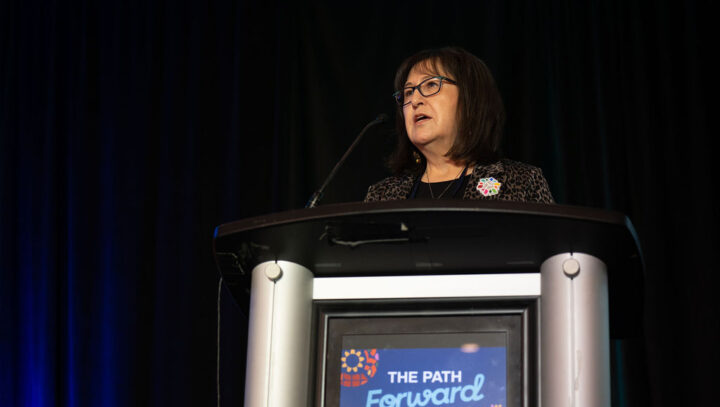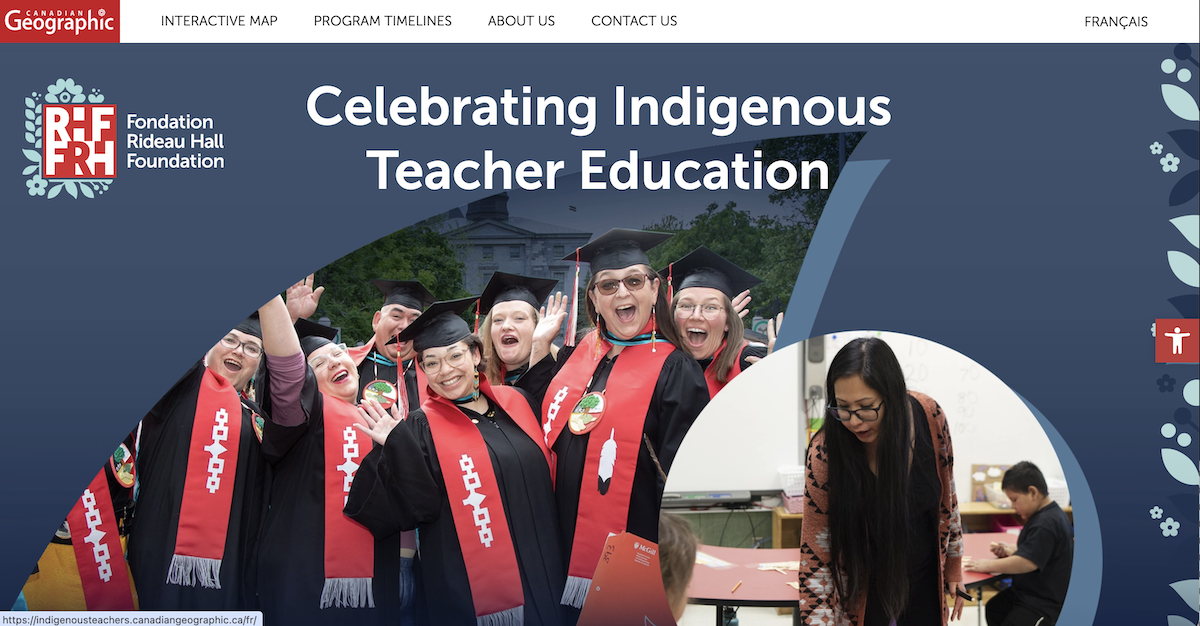Rooted in a belief in the transformative role that teachers can play in the lives in students, the RHF is pleased to announce an investment of $13.2 million in seven Indigenous-led and teacher education programs. Guided by the National Advisory Committee on Indigenous Teacher Education (NACITE), the RHF is supporting community-led efforts to increase capacity to hire and train First Nations, Inuit and Métis teachers – creating lasting, positive change for Indigenous communities across Canada. As a part of our Initiative and journey to enrich Canada’s education system with 10,000 Indigenous teachers, we believe we all benefit when Indigenous teachers are in classrooms across Canada.
This funding stream focused on four themes: Language, Land, Leadership and Love.
”Land” reinforced the importance of learning from the land, including understanding First Nations, Métis and Inuit ecological knowledge and how Indigenous cultures connect with nature. It involves activities like outdoor education and using the land as a classroom to teach these concepts effectively.
”Language” focused on preserving, revitalizing, and promoting First Nations, Métis and Inuit languages in teacher education, recognizing the critical importance of identity, culture, and knowledge acquisition. This supports initiatives including language teacher accreditation and integrating Indigenous languages into teacher education programs.
“Leadership” emphasized the importance of First Nations, Métis and Inuit leadership in education, focusing on developing leadership skills and capacity among Indigenous educators, with development that supports communities, promotes Indigenous perspectives, and advocates for positive changes in educational policies and practices.
”Love” focused on creating a nurturing and inclusive learning environment in First Nations, Metis and Inuit teacher education by emphasizing caring relationships, community connections, and well-being for both educators and students, with initiatives potentially including wrap-around support for students, and integration of the importance of traditional ceremony and customary practices.
These four themes emanated from the RHF’s national gathering on Indigenous Teacher Education in June 2023, an event that brought together more than 200 leaders in FNIM (First Nations, Inuit, Métis) teacher education from coast to coast to coast. We are honoured and proud to highlight and support these grant recipients and their efforts to lead the way in Indigenous teacher education:
Yukon University, Yukon First Nation Education Directorate, First Nation School Board, YK: $2 million is being awarded towards the Collaborative Indigenous Teachers Education Program. The four-year program will transform education by challenging inequitable approaches. In collaboration with Knowledge Keepers, Yukon University will help to bridge the education gap and create culturally responsive learning environments.
University nuxełhot’įne thaaɁehots’į nistameyimâkanak Blue Quills (Treaty No. 6 Territory): With a $2 million grant to kick start a five-year project, kiskeyihtamowin kiskinohamatowin (teach each other) aims to create three distinct teacher education streams – immersion, elementary and secondary programming. Rooted in Land, language, Ceremony, and relationship, the project is guided by the laws of love, honesty, sharing and strength.
Gabriel Dumont Institute (SK): Over the next four years, the Métis-led organization will invest $1,280,000 in grant funding in their Expanding Teachers Education Program. This will support the institute in expanding their capacity to accept and train more Indigenous students in their journeys to become teachers. The grant will also cover the cost of tuition, living expenses, additional resources, faculties and flexibility for online learning.
Seven Generations Education Institute (ON): The institute will create pathways for Indigenous language teacher training by investing a $2 million grant in their five-year, Indigenous-led project Language Creates the Farm Team. Adopting the Elders Circle approach, the program integrates culture and land-based teachings with an emphasis on building from an earlier practicum.
Mi’kmaq Wolastoqey Centre – University of New Brunswick (NB): A $1,999,000 grant toward their five-year project, Culturally Grounded Indigenous Teachers, will redesign the Bachelor of Education program to include Indigenous language immersion with a land-based approach.
University College of the North (MB): Receiving a $2 million grant toward its Teacher Training and Language Revitalization in Northern Manitoba: Building Capacity Together program. The five-year project aims to expand teachers’ training with semi-remote pathways, enhance language certifications, facilitate transitions to BA and BEd programs, and implement a literacy readiness initiative with land-based and language training support.
Office of First Nations and Inuit Education (OFNIE) – McGill University, QC: Their Strong Foundations, Strong Partnerships, and Strong Futures: Advancing Indigenous Teacher Education by Investing in Instruction program is being awarded $1,979,664. Collaborating with education authorities such as Kativik Ilisarniliriniq, Cree School Board, Kahnawake, Kanehsatake Education Centres, and Central Quebec School Board, the partnership is focusing on community-based teacher education and professional development.
Together these projects will help to create transformative, long-lasting changes in Indigenous teacher education systems across Canada by increasing Indigenous representation in the workforce and through the inclusion of Indigenous knowledge, ways of being, and culturally responsive approaches.
This moment marks an important step in a shared journey. The RHF’s commitment to advancing Indigenous Teacher Education in Canada will see change driven through four main strategies: investing in innovative community-driven programming; creating spaces for convening and connecting; amplifying the stories of excellence and impact in Indigenous teacher education; and rooting our work in better data and Indigenous-led research. The RHF is grateful for initial funding support by the Mastercard Foundation for helping to make possible this vision and work.



